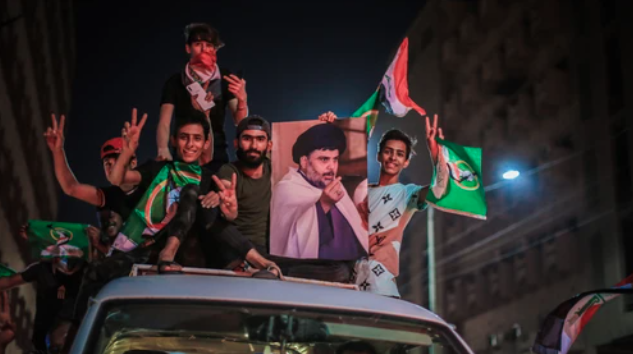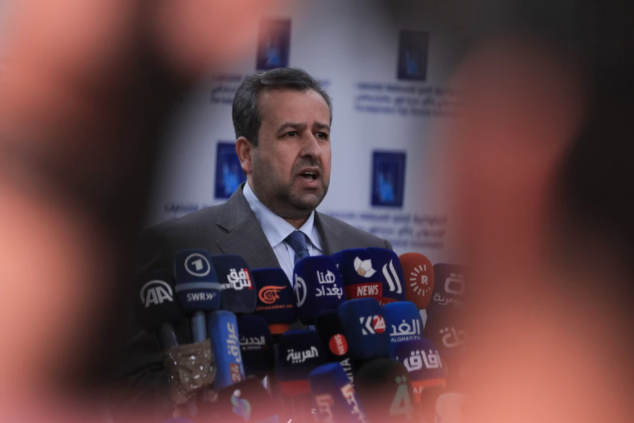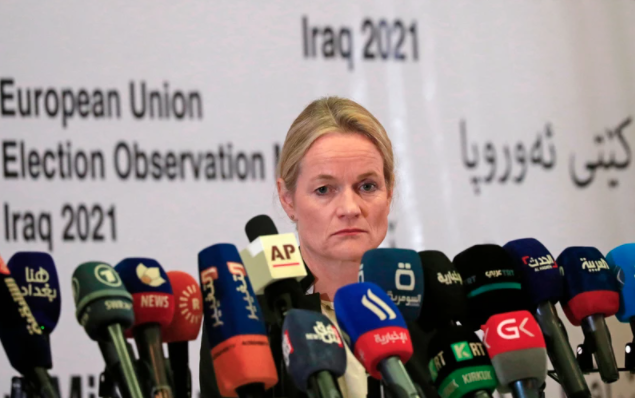Iraq is on a knife edge after inconclusive results in an election triggered by a youth-led uprising and marred by historically low turnout.
Preliminary results in the sixth parliamentary elections since Saddam Hussein was ousted following the US-led invasion and occupation in 2003 showed populist Shia cleric Muqtada al-Sadr’s list leading with 73 seats out of the 329 up for grabs.
The success of candidates backed by Sadr – a fickle character who fought US troops for years through the Mahdi Army militias – was largely at the expense of Iranian-backed militias represented by the Fatah Alliance. Meanwhile, candidates backed by former prime minister Nouri al-Maliki and the current speaker of parliament, Mohamed al-Halbousi, performed well.
The main takeaway so far from the results is the low turnout, with only around 9 million people out of 26 million eligible voters actually voting.
A quasi-political envoy to neighbouring countries in the orbit of influence of the Islamic Republic, Qaani replaced the notorious General Qassem Soleimani after he was killed in a US drone strike in Baghdad in early 2020. Iranian-backed militias have so far refused to accept the initial election results.
Abu Ali al-Askari, a spokesperson for the Iranian-backed Kataib Hezbollah militia group, described the elections as the “biggest scam in history” in a statement shared on his Telegram channel.
Hadi al-Amiri, the leader of the Fateh coalition, the political front of Iran-backed militias, called initial results “fabricated,” and he said that he would challenge the outcome at any cost and said: “We will defend the votes of our candidates.”
Iraq’s constitution, adopted after the 2003 invasion, guarantees the prime minister’s position to the Shia, the presidency to the Kurds, and parliament speaker to the Sunnis – a division designed along religious and ethnic composition.
Currently, Iraq is ruled by an elite based on tribal, sectarian, and ethnic affiliations. Different groups with armed wings have gained more influence through access to lucrative government contracts, creating an extensive network of a patronage system through nepotism and favouring fellow party members all over the country.
Viola von Cramon, the head of the EU’s delegation to monitor the elections, said the low turnout was a “clear political signal” to the political establishment in the country. “The 2021 early parliamentary elections were technically well-managed and competitive, despite challenges as regards level playing field for candidates and problematic aspects of the legal framework,” she said at a press conference.
“Voting on election day was largely peaceful and orderly. Voters were able to freely express their will, but turnout was low,” she added.
In the weeks leading to the elections, calls to boycott the elections dominated the Iraqi streets, and millions of Iraqis refused to register and cast their votes for an election that although brought forward, was also delayed from June this year due to a lack of preparation and the impact of the coronavirus pandemic.
Mustafa, an anti-government protester from Baghdad who fled to Erbil following threats on his life and asked to use only his first name, told VICE World News that the election on Sunday was just another phase of the “deadly cycle” in the Iraqi political process and said “Same stone, same bath,” a famous proverb in the Middle East widely used to describe business as usual.
Source (Click Here)




 RSS Feed
RSS Feed